Research Methodology Report on Dietary Preferences and Choices
VerifiedAdded on 2022/11/09
|12
|3180
|2
Report
AI Summary
This report details the research methodology employed to investigate the reasons behind people's preference for vegetables over meat. The study utilized a qualitative research design, specifically ethnography, to explore the social phenomenon of dietary choices. An experimental method was used for data collection, involving a sample of 20 participants from the general public. Data was collected through structured questionnaires and subjected to both descriptive and inferential statistical analysis, including tests like Kolmogorov-Smirnov and chi-square. The report outlines the sampling frame, sample size determination using random sampling, data collection procedures, and the measures taken to ensure participant confidentiality and accurate data. The study's feasibility is discussed, emphasizing the objective of understanding the factors influencing the choice between vegetables and meat, with a focus on purchasing intentions and their impact on dietary decisions. The report provides a comprehensive overview of the research process, from design to analysis, aiming to provide insights into consumer behavior related to food choices.

Running Head: RESEARCH METHODOLOGY
1
Research Methodology
Name
Institution
Date
1
Research Methodology
Name
Institution
Date
Paraphrase This Document
Need a fresh take? Get an instant paraphrase of this document with our AI Paraphraser
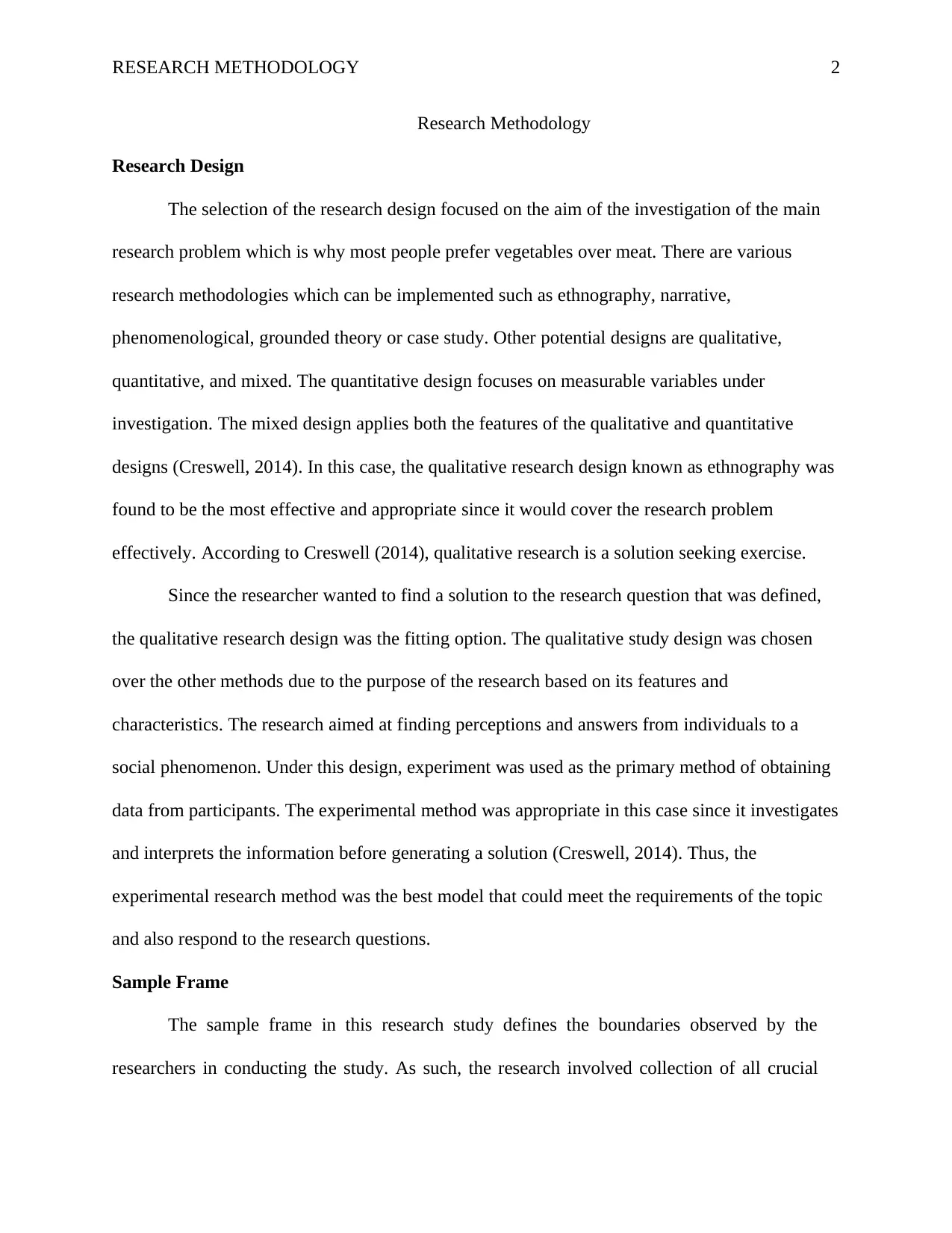
RESEARCH METHODOLOGY 2
Research Methodology
Research Design
The selection of the research design focused on the aim of the investigation of the main
research problem which is why most people prefer vegetables over meat. There are various
research methodologies which can be implemented such as ethnography, narrative,
phenomenological, grounded theory or case study. Other potential designs are qualitative,
quantitative, and mixed. The quantitative design focuses on measurable variables under
investigation. The mixed design applies both the features of the qualitative and quantitative
designs (Creswell, 2014). In this case, the qualitative research design known as ethnography was
found to be the most effective and appropriate since it would cover the research problem
effectively. According to Creswell (2014), qualitative research is a solution seeking exercise.
Since the researcher wanted to find a solution to the research question that was defined,
the qualitative research design was the fitting option. The qualitative study design was chosen
over the other methods due to the purpose of the research based on its features and
characteristics. The research aimed at finding perceptions and answers from individuals to a
social phenomenon. Under this design, experiment was used as the primary method of obtaining
data from participants. The experimental method was appropriate in this case since it investigates
and interprets the information before generating a solution (Creswell, 2014). Thus, the
experimental research method was the best model that could meet the requirements of the topic
and also respond to the research questions.
Sample Frame
The sample frame in this research study defines the boundaries observed by the
researchers in conducting the study. As such, the research involved collection of all crucial
Research Methodology
Research Design
The selection of the research design focused on the aim of the investigation of the main
research problem which is why most people prefer vegetables over meat. There are various
research methodologies which can be implemented such as ethnography, narrative,
phenomenological, grounded theory or case study. Other potential designs are qualitative,
quantitative, and mixed. The quantitative design focuses on measurable variables under
investigation. The mixed design applies both the features of the qualitative and quantitative
designs (Creswell, 2014). In this case, the qualitative research design known as ethnography was
found to be the most effective and appropriate since it would cover the research problem
effectively. According to Creswell (2014), qualitative research is a solution seeking exercise.
Since the researcher wanted to find a solution to the research question that was defined,
the qualitative research design was the fitting option. The qualitative study design was chosen
over the other methods due to the purpose of the research based on its features and
characteristics. The research aimed at finding perceptions and answers from individuals to a
social phenomenon. Under this design, experiment was used as the primary method of obtaining
data from participants. The experimental method was appropriate in this case since it investigates
and interprets the information before generating a solution (Creswell, 2014). Thus, the
experimental research method was the best model that could meet the requirements of the topic
and also respond to the research questions.
Sample Frame
The sample frame in this research study defines the boundaries observed by the
researchers in conducting the study. As such, the research involved collection of all crucial
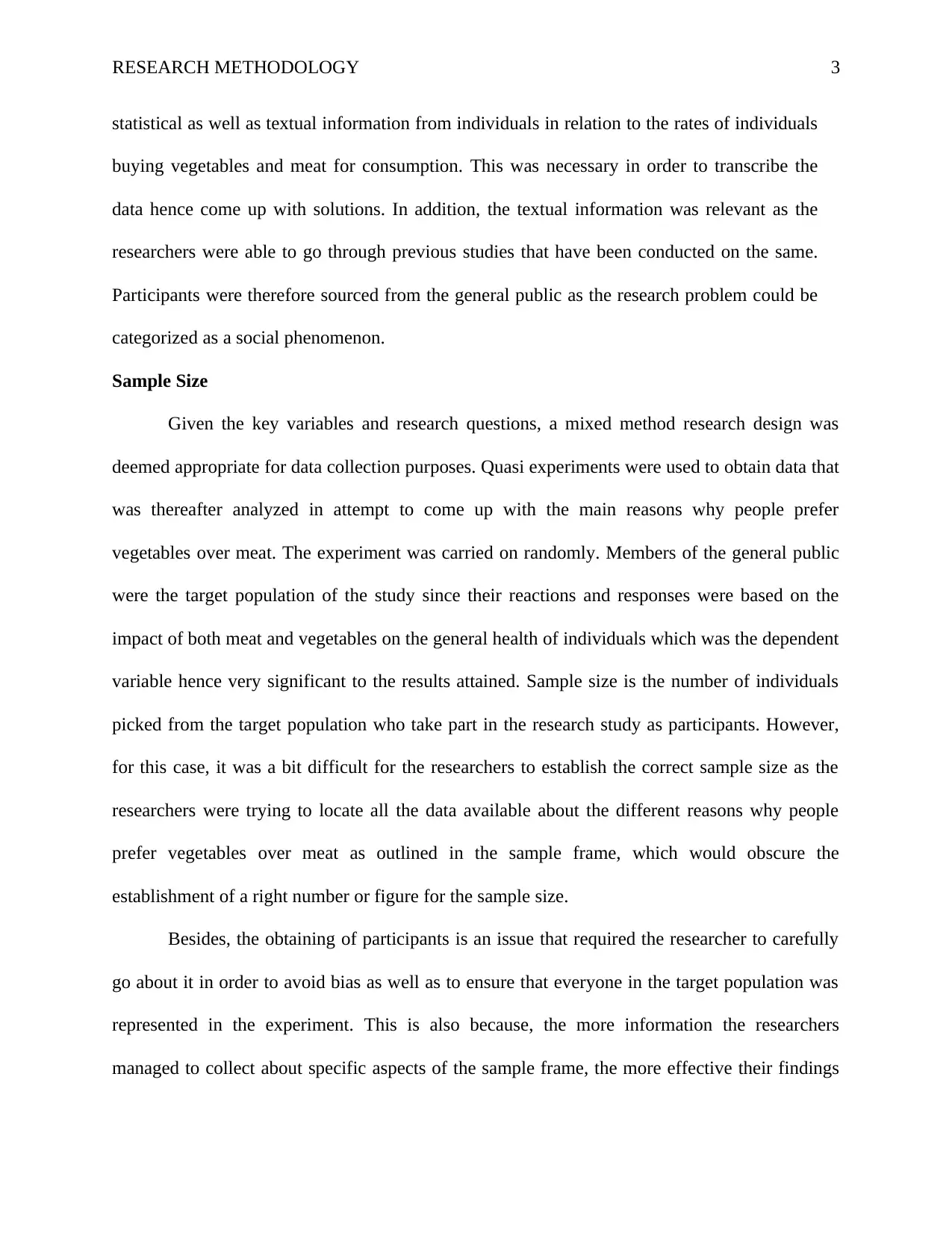
RESEARCH METHODOLOGY 3
statistical as well as textual information from individuals in relation to the rates of individuals
buying vegetables and meat for consumption. This was necessary in order to transcribe the
data hence come up with solutions. In addition, the textual information was relevant as the
researchers were able to go through previous studies that have been conducted on the same.
Participants were therefore sourced from the general public as the research problem could be
categorized as a social phenomenon.
Sample Size
Given the key variables and research questions, a mixed method research design was
deemed appropriate for data collection purposes. Quasi experiments were used to obtain data that
was thereafter analyzed in attempt to come up with the main reasons why people prefer
vegetables over meat. The experiment was carried on randomly. Members of the general public
were the target population of the study since their reactions and responses were based on the
impact of both meat and vegetables on the general health of individuals which was the dependent
variable hence very significant to the results attained. Sample size is the number of individuals
picked from the target population who take part in the research study as participants. However,
for this case, it was a bit difficult for the researchers to establish the correct sample size as the
researchers were trying to locate all the data available about the different reasons why people
prefer vegetables over meat as outlined in the sample frame, which would obscure the
establishment of a right number or figure for the sample size.
Besides, the obtaining of participants is an issue that required the researcher to carefully
go about it in order to avoid bias as well as to ensure that everyone in the target population was
represented in the experiment. This is also because, the more information the researchers
managed to collect about specific aspects of the sample frame, the more effective their findings
statistical as well as textual information from individuals in relation to the rates of individuals
buying vegetables and meat for consumption. This was necessary in order to transcribe the
data hence come up with solutions. In addition, the textual information was relevant as the
researchers were able to go through previous studies that have been conducted on the same.
Participants were therefore sourced from the general public as the research problem could be
categorized as a social phenomenon.
Sample Size
Given the key variables and research questions, a mixed method research design was
deemed appropriate for data collection purposes. Quasi experiments were used to obtain data that
was thereafter analyzed in attempt to come up with the main reasons why people prefer
vegetables over meat. The experiment was carried on randomly. Members of the general public
were the target population of the study since their reactions and responses were based on the
impact of both meat and vegetables on the general health of individuals which was the dependent
variable hence very significant to the results attained. Sample size is the number of individuals
picked from the target population who take part in the research study as participants. However,
for this case, it was a bit difficult for the researchers to establish the correct sample size as the
researchers were trying to locate all the data available about the different reasons why people
prefer vegetables over meat as outlined in the sample frame, which would obscure the
establishment of a right number or figure for the sample size.
Besides, the obtaining of participants is an issue that required the researcher to carefully
go about it in order to avoid bias as well as to ensure that everyone in the target population was
represented in the experiment. This is also because, the more information the researchers
managed to collect about specific aspects of the sample frame, the more effective their findings
⊘ This is a preview!⊘
Do you want full access?
Subscribe today to unlock all pages.

Trusted by 1+ million students worldwide
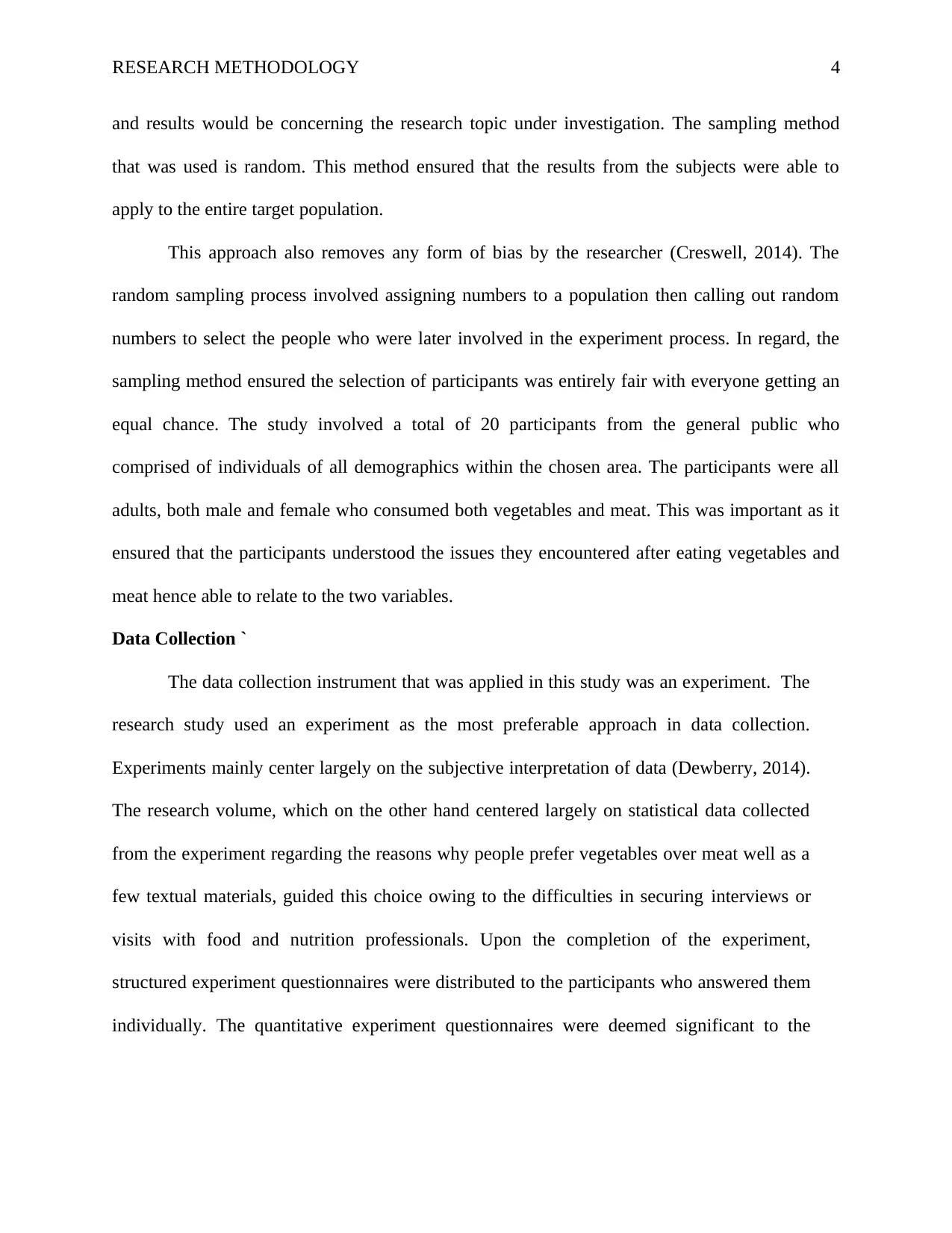
RESEARCH METHODOLOGY 4
and results would be concerning the research topic under investigation. The sampling method
that was used is random. This method ensured that the results from the subjects were able to
apply to the entire target population.
This approach also removes any form of bias by the researcher (Creswell, 2014). The
random sampling process involved assigning numbers to a population then calling out random
numbers to select the people who were later involved in the experiment process. In regard, the
sampling method ensured the selection of participants was entirely fair with everyone getting an
equal chance. The study involved a total of 20 participants from the general public who
comprised of individuals of all demographics within the chosen area. The participants were all
adults, both male and female who consumed both vegetables and meat. This was important as it
ensured that the participants understood the issues they encountered after eating vegetables and
meat hence able to relate to the two variables.
Data Collection `
The data collection instrument that was applied in this study was an experiment. The
research study used an experiment as the most preferable approach in data collection.
Experiments mainly center largely on the subjective interpretation of data (Dewberry, 2014).
The research volume, which on the other hand centered largely on statistical data collected
from the experiment regarding the reasons why people prefer vegetables over meat well as a
few textual materials, guided this choice owing to the difficulties in securing interviews or
visits with food and nutrition professionals. Upon the completion of the experiment,
structured experiment questionnaires were distributed to the participants who answered them
individually. The quantitative experiment questionnaires were deemed significant to the
and results would be concerning the research topic under investigation. The sampling method
that was used is random. This method ensured that the results from the subjects were able to
apply to the entire target population.
This approach also removes any form of bias by the researcher (Creswell, 2014). The
random sampling process involved assigning numbers to a population then calling out random
numbers to select the people who were later involved in the experiment process. In regard, the
sampling method ensured the selection of participants was entirely fair with everyone getting an
equal chance. The study involved a total of 20 participants from the general public who
comprised of individuals of all demographics within the chosen area. The participants were all
adults, both male and female who consumed both vegetables and meat. This was important as it
ensured that the participants understood the issues they encountered after eating vegetables and
meat hence able to relate to the two variables.
Data Collection `
The data collection instrument that was applied in this study was an experiment. The
research study used an experiment as the most preferable approach in data collection.
Experiments mainly center largely on the subjective interpretation of data (Dewberry, 2014).
The research volume, which on the other hand centered largely on statistical data collected
from the experiment regarding the reasons why people prefer vegetables over meat well as a
few textual materials, guided this choice owing to the difficulties in securing interviews or
visits with food and nutrition professionals. Upon the completion of the experiment,
structured experiment questionnaires were distributed to the participants who answered them
individually. The quantitative experiment questionnaires were deemed significant to the
Paraphrase This Document
Need a fresh take? Get an instant paraphrase of this document with our AI Paraphraser
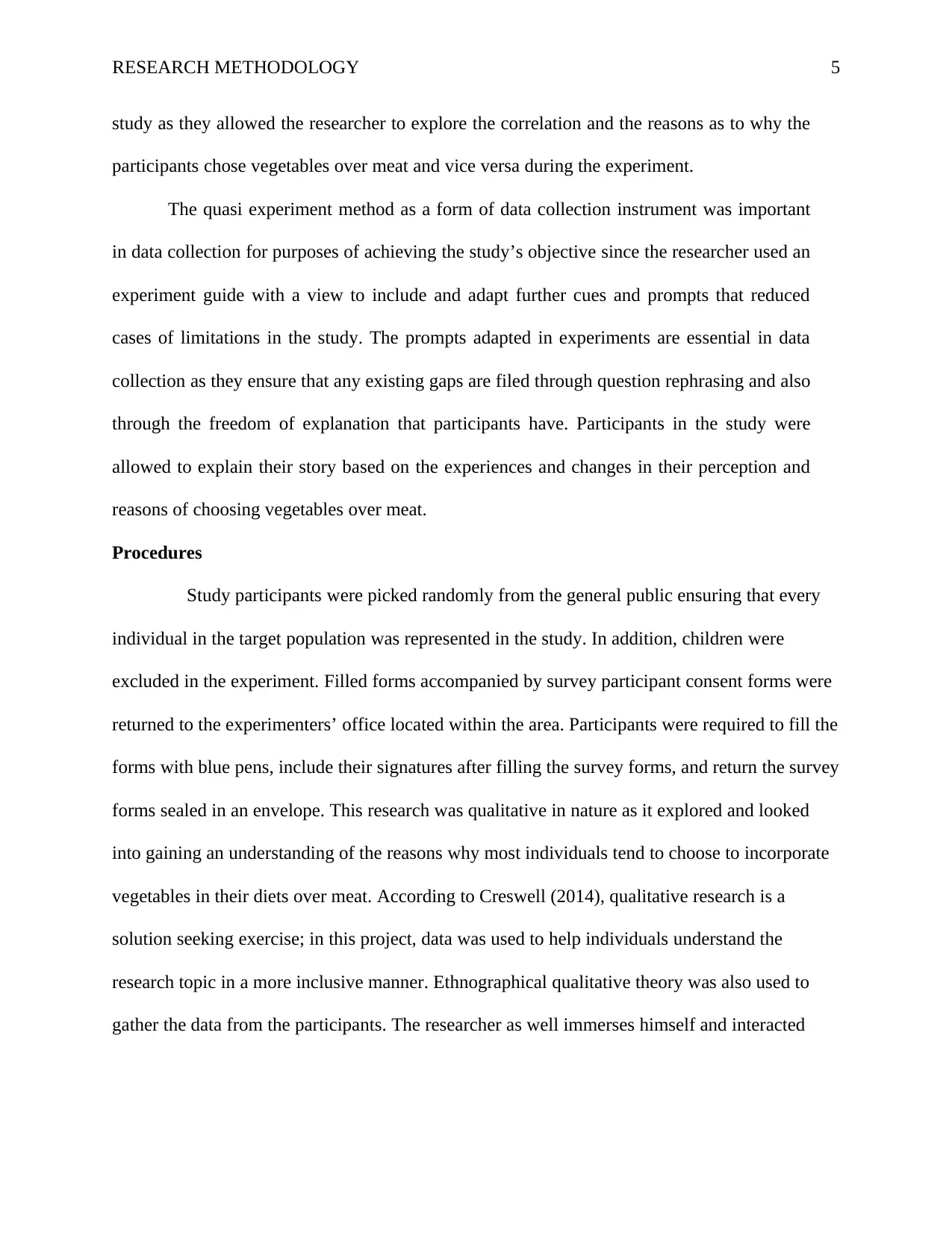
RESEARCH METHODOLOGY 5
study as they allowed the researcher to explore the correlation and the reasons as to why the
participants chose vegetables over meat and vice versa during the experiment.
The quasi experiment method as a form of data collection instrument was important
in data collection for purposes of achieving the study’s objective since the researcher used an
experiment guide with a view to include and adapt further cues and prompts that reduced
cases of limitations in the study. The prompts adapted in experiments are essential in data
collection as they ensure that any existing gaps are filed through question rephrasing and also
through the freedom of explanation that participants have. Participants in the study were
allowed to explain their story based on the experiences and changes in their perception and
reasons of choosing vegetables over meat.
Procedures
Study participants were picked randomly from the general public ensuring that every
individual in the target population was represented in the study. In addition, children were
excluded in the experiment. Filled forms accompanied by survey participant consent forms were
returned to the experimenters’ office located within the area. Participants were required to fill the
forms with blue pens, include their signatures after filling the survey forms, and return the survey
forms sealed in an envelope. This research was qualitative in nature as it explored and looked
into gaining an understanding of the reasons why most individuals tend to choose to incorporate
vegetables in their diets over meat. According to Creswell (2014), qualitative research is a
solution seeking exercise; in this project, data was used to help individuals understand the
research topic in a more inclusive manner. Ethnographical qualitative theory was also used to
gather the data from the participants. The researcher as well immerses himself and interacted
study as they allowed the researcher to explore the correlation and the reasons as to why the
participants chose vegetables over meat and vice versa during the experiment.
The quasi experiment method as a form of data collection instrument was important
in data collection for purposes of achieving the study’s objective since the researcher used an
experiment guide with a view to include and adapt further cues and prompts that reduced
cases of limitations in the study. The prompts adapted in experiments are essential in data
collection as they ensure that any existing gaps are filed through question rephrasing and also
through the freedom of explanation that participants have. Participants in the study were
allowed to explain their story based on the experiences and changes in their perception and
reasons of choosing vegetables over meat.
Procedures
Study participants were picked randomly from the general public ensuring that every
individual in the target population was represented in the study. In addition, children were
excluded in the experiment. Filled forms accompanied by survey participant consent forms were
returned to the experimenters’ office located within the area. Participants were required to fill the
forms with blue pens, include their signatures after filling the survey forms, and return the survey
forms sealed in an envelope. This research was qualitative in nature as it explored and looked
into gaining an understanding of the reasons why most individuals tend to choose to incorporate
vegetables in their diets over meat. According to Creswell (2014), qualitative research is a
solution seeking exercise; in this project, data was used to help individuals understand the
research topic in a more inclusive manner. Ethnographical qualitative theory was also used to
gather the data from the participants. The researcher as well immerses himself and interacted
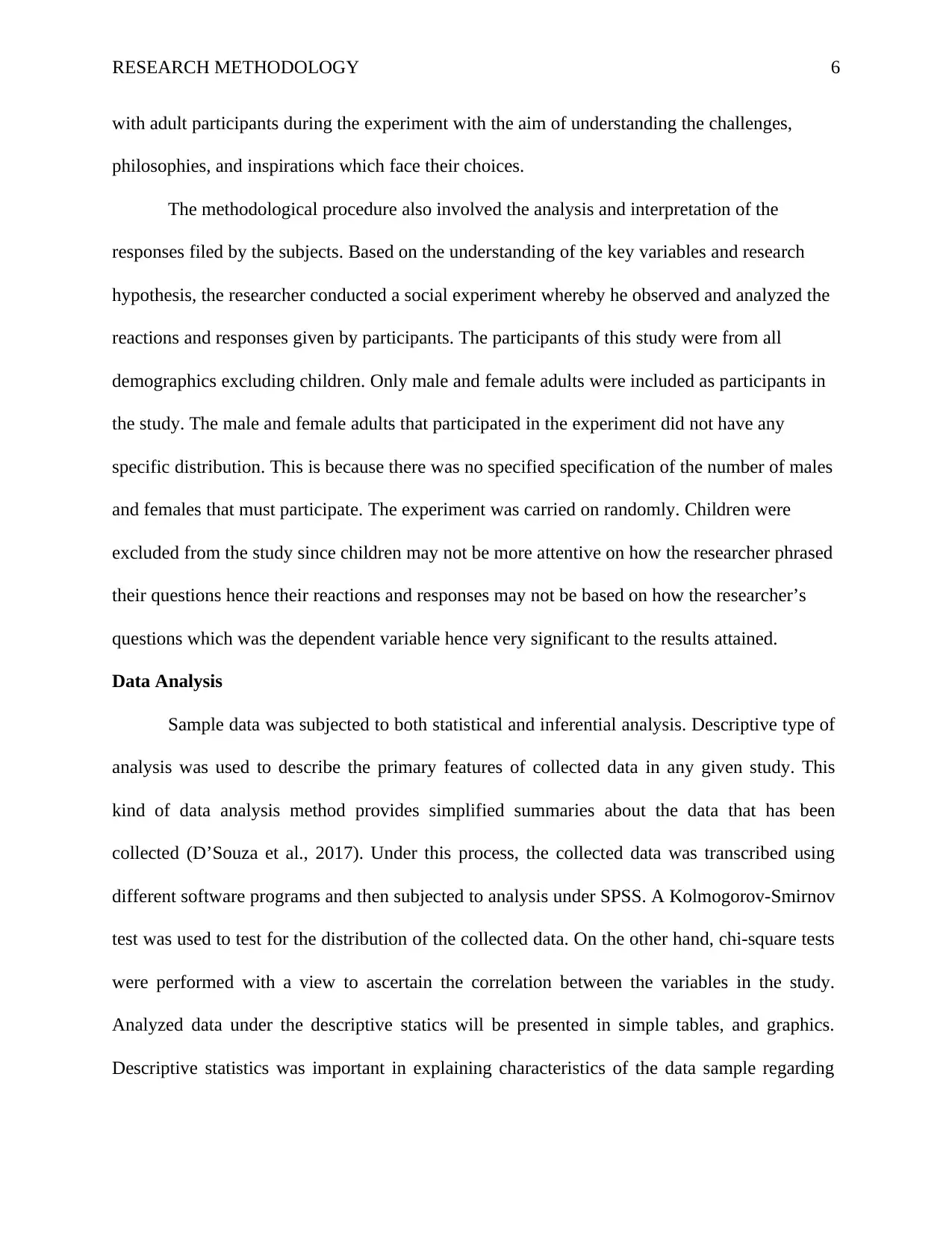
RESEARCH METHODOLOGY 6
with adult participants during the experiment with the aim of understanding the challenges,
philosophies, and inspirations which face their choices.
The methodological procedure also involved the analysis and interpretation of the
responses filed by the subjects. Based on the understanding of the key variables and research
hypothesis, the researcher conducted a social experiment whereby he observed and analyzed the
reactions and responses given by participants. The participants of this study were from all
demographics excluding children. Only male and female adults were included as participants in
the study. The male and female adults that participated in the experiment did not have any
specific distribution. This is because there was no specified specification of the number of males
and females that must participate. The experiment was carried on randomly. Children were
excluded from the study since children may not be more attentive on how the researcher phrased
their questions hence their reactions and responses may not be based on how the researcher’s
questions which was the dependent variable hence very significant to the results attained.
Data Analysis
Sample data was subjected to both statistical and inferential analysis. Descriptive type of
analysis was used to describe the primary features of collected data in any given study. This
kind of data analysis method provides simplified summaries about the data that has been
collected (D’Souza et al., 2017). Under this process, the collected data was transcribed using
different software programs and then subjected to analysis under SPSS. A Kolmogorov-Smirnov
test was used to test for the distribution of the collected data. On the other hand, chi-square tests
were performed with a view to ascertain the correlation between the variables in the study.
Analyzed data under the descriptive statics will be presented in simple tables, and graphics.
Descriptive statistics was important in explaining characteristics of the data sample regarding
with adult participants during the experiment with the aim of understanding the challenges,
philosophies, and inspirations which face their choices.
The methodological procedure also involved the analysis and interpretation of the
responses filed by the subjects. Based on the understanding of the key variables and research
hypothesis, the researcher conducted a social experiment whereby he observed and analyzed the
reactions and responses given by participants. The participants of this study were from all
demographics excluding children. Only male and female adults were included as participants in
the study. The male and female adults that participated in the experiment did not have any
specific distribution. This is because there was no specified specification of the number of males
and females that must participate. The experiment was carried on randomly. Children were
excluded from the study since children may not be more attentive on how the researcher phrased
their questions hence their reactions and responses may not be based on how the researcher’s
questions which was the dependent variable hence very significant to the results attained.
Data Analysis
Sample data was subjected to both statistical and inferential analysis. Descriptive type of
analysis was used to describe the primary features of collected data in any given study. This
kind of data analysis method provides simplified summaries about the data that has been
collected (D’Souza et al., 2017). Under this process, the collected data was transcribed using
different software programs and then subjected to analysis under SPSS. A Kolmogorov-Smirnov
test was used to test for the distribution of the collected data. On the other hand, chi-square tests
were performed with a view to ascertain the correlation between the variables in the study.
Analyzed data under the descriptive statics will be presented in simple tables, and graphics.
Descriptive statistics was important in explaining characteristics of the data sample regarding
⊘ This is a preview!⊘
Do you want full access?
Subscribe today to unlock all pages.

Trusted by 1+ million students worldwide
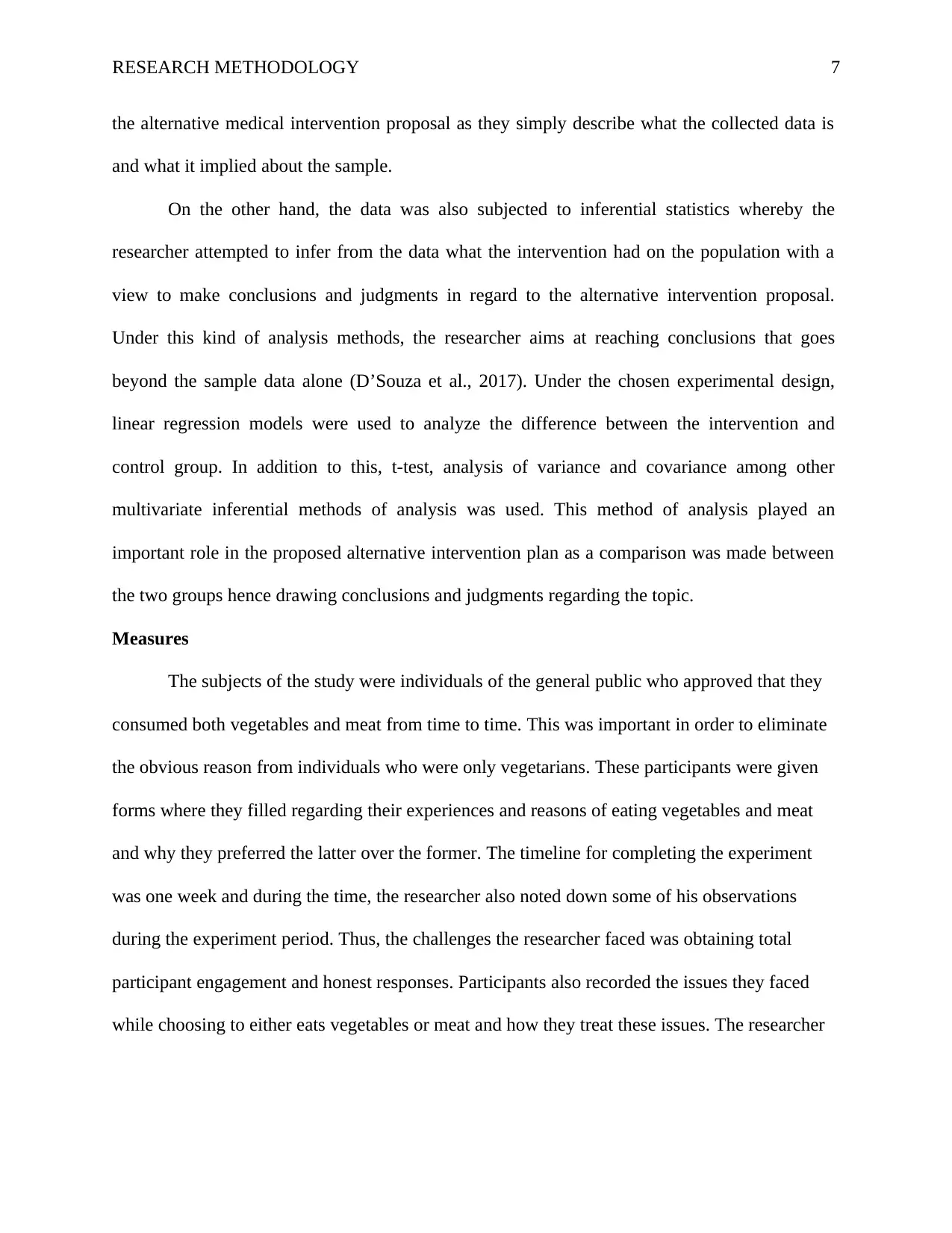
RESEARCH METHODOLOGY 7
the alternative medical intervention proposal as they simply describe what the collected data is
and what it implied about the sample.
On the other hand, the data was also subjected to inferential statistics whereby the
researcher attempted to infer from the data what the intervention had on the population with a
view to make conclusions and judgments in regard to the alternative intervention proposal.
Under this kind of analysis methods, the researcher aims at reaching conclusions that goes
beyond the sample data alone (D’Souza et al., 2017). Under the chosen experimental design,
linear regression models were used to analyze the difference between the intervention and
control group. In addition to this, t-test, analysis of variance and covariance among other
multivariate inferential methods of analysis was used. This method of analysis played an
important role in the proposed alternative intervention plan as a comparison was made between
the two groups hence drawing conclusions and judgments regarding the topic.
Measures
The subjects of the study were individuals of the general public who approved that they
consumed both vegetables and meat from time to time. This was important in order to eliminate
the obvious reason from individuals who were only vegetarians. These participants were given
forms where they filled regarding their experiences and reasons of eating vegetables and meat
and why they preferred the latter over the former. The timeline for completing the experiment
was one week and during the time, the researcher also noted down some of his observations
during the experiment period. Thus, the challenges the researcher faced was obtaining total
participant engagement and honest responses. Participants also recorded the issues they faced
while choosing to either eats vegetables or meat and how they treat these issues. The researcher
the alternative medical intervention proposal as they simply describe what the collected data is
and what it implied about the sample.
On the other hand, the data was also subjected to inferential statistics whereby the
researcher attempted to infer from the data what the intervention had on the population with a
view to make conclusions and judgments in regard to the alternative intervention proposal.
Under this kind of analysis methods, the researcher aims at reaching conclusions that goes
beyond the sample data alone (D’Souza et al., 2017). Under the chosen experimental design,
linear regression models were used to analyze the difference between the intervention and
control group. In addition to this, t-test, analysis of variance and covariance among other
multivariate inferential methods of analysis was used. This method of analysis played an
important role in the proposed alternative intervention plan as a comparison was made between
the two groups hence drawing conclusions and judgments regarding the topic.
Measures
The subjects of the study were individuals of the general public who approved that they
consumed both vegetables and meat from time to time. This was important in order to eliminate
the obvious reason from individuals who were only vegetarians. These participants were given
forms where they filled regarding their experiences and reasons of eating vegetables and meat
and why they preferred the latter over the former. The timeline for completing the experiment
was one week and during the time, the researcher also noted down some of his observations
during the experiment period. Thus, the challenges the researcher faced was obtaining total
participant engagement and honest responses. Participants also recorded the issues they faced
while choosing to either eats vegetables or meat and how they treat these issues. The researcher
Paraphrase This Document
Need a fresh take? Get an instant paraphrase of this document with our AI Paraphraser
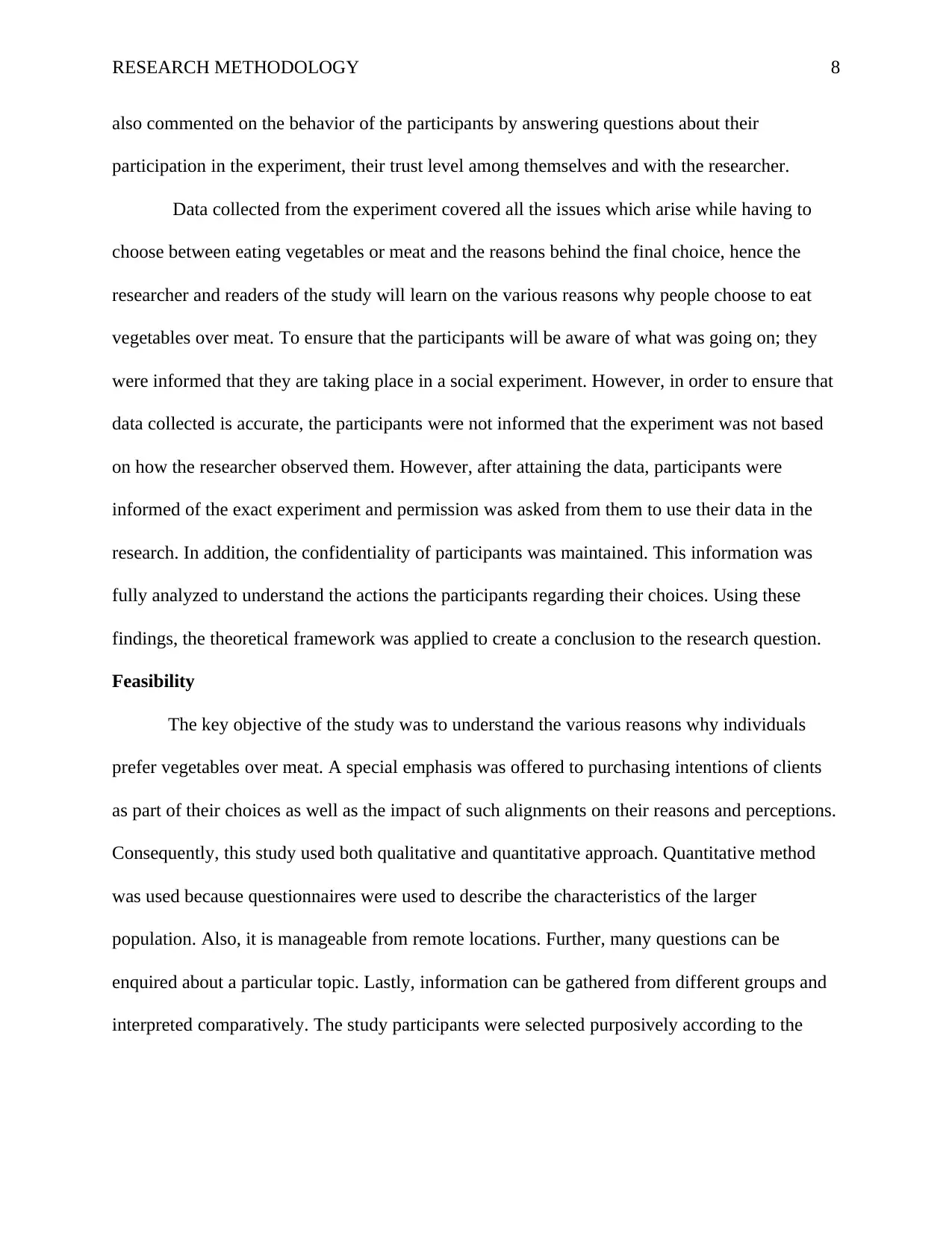
RESEARCH METHODOLOGY 8
also commented on the behavior of the participants by answering questions about their
participation in the experiment, their trust level among themselves and with the researcher.
Data collected from the experiment covered all the issues which arise while having to
choose between eating vegetables or meat and the reasons behind the final choice, hence the
researcher and readers of the study will learn on the various reasons why people choose to eat
vegetables over meat. To ensure that the participants will be aware of what was going on; they
were informed that they are taking place in a social experiment. However, in order to ensure that
data collected is accurate, the participants were not informed that the experiment was not based
on how the researcher observed them. However, after attaining the data, participants were
informed of the exact experiment and permission was asked from them to use their data in the
research. In addition, the confidentiality of participants was maintained. This information was
fully analyzed to understand the actions the participants regarding their choices. Using these
findings, the theoretical framework was applied to create a conclusion to the research question.
Feasibility
The key objective of the study was to understand the various reasons why individuals
prefer vegetables over meat. A special emphasis was offered to purchasing intentions of clients
as part of their choices as well as the impact of such alignments on their reasons and perceptions.
Consequently, this study used both qualitative and quantitative approach. Quantitative method
was used because questionnaires were used to describe the characteristics of the larger
population. Also, it is manageable from remote locations. Further, many questions can be
enquired about a particular topic. Lastly, information can be gathered from different groups and
interpreted comparatively. The study participants were selected purposively according to the
also commented on the behavior of the participants by answering questions about their
participation in the experiment, their trust level among themselves and with the researcher.
Data collected from the experiment covered all the issues which arise while having to
choose between eating vegetables or meat and the reasons behind the final choice, hence the
researcher and readers of the study will learn on the various reasons why people choose to eat
vegetables over meat. To ensure that the participants will be aware of what was going on; they
were informed that they are taking place in a social experiment. However, in order to ensure that
data collected is accurate, the participants were not informed that the experiment was not based
on how the researcher observed them. However, after attaining the data, participants were
informed of the exact experiment and permission was asked from them to use their data in the
research. In addition, the confidentiality of participants was maintained. This information was
fully analyzed to understand the actions the participants regarding their choices. Using these
findings, the theoretical framework was applied to create a conclusion to the research question.
Feasibility
The key objective of the study was to understand the various reasons why individuals
prefer vegetables over meat. A special emphasis was offered to purchasing intentions of clients
as part of their choices as well as the impact of such alignments on their reasons and perceptions.
Consequently, this study used both qualitative and quantitative approach. Quantitative method
was used because questionnaires were used to describe the characteristics of the larger
population. Also, it is manageable from remote locations. Further, many questions can be
enquired about a particular topic. Lastly, information can be gathered from different groups and
interpreted comparatively. The study participants were selected purposively according to the
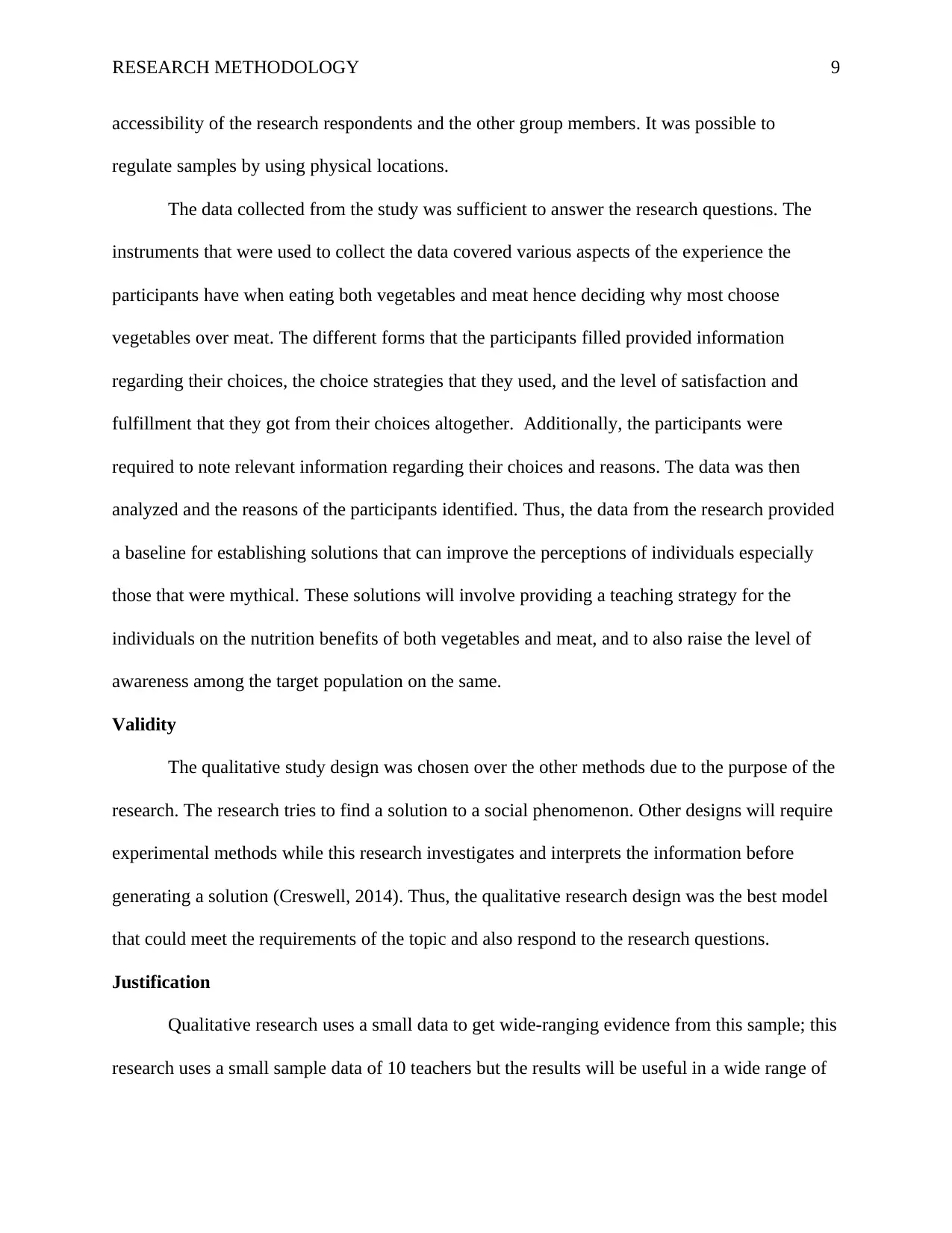
RESEARCH METHODOLOGY 9
accessibility of the research respondents and the other group members. It was possible to
regulate samples by using physical locations.
The data collected from the study was sufficient to answer the research questions. The
instruments that were used to collect the data covered various aspects of the experience the
participants have when eating both vegetables and meat hence deciding why most choose
vegetables over meat. The different forms that the participants filled provided information
regarding their choices, the choice strategies that they used, and the level of satisfaction and
fulfillment that they got from their choices altogether. Additionally, the participants were
required to note relevant information regarding their choices and reasons. The data was then
analyzed and the reasons of the participants identified. Thus, the data from the research provided
a baseline for establishing solutions that can improve the perceptions of individuals especially
those that were mythical. These solutions will involve providing a teaching strategy for the
individuals on the nutrition benefits of both vegetables and meat, and to also raise the level of
awareness among the target population on the same.
Validity
The qualitative study design was chosen over the other methods due to the purpose of the
research. The research tries to find a solution to a social phenomenon. Other designs will require
experimental methods while this research investigates and interprets the information before
generating a solution (Creswell, 2014). Thus, the qualitative research design was the best model
that could meet the requirements of the topic and also respond to the research questions.
Justification
Qualitative research uses a small data to get wide-ranging evidence from this sample; this
research uses a small sample data of 10 teachers but the results will be useful in a wide range of
accessibility of the research respondents and the other group members. It was possible to
regulate samples by using physical locations.
The data collected from the study was sufficient to answer the research questions. The
instruments that were used to collect the data covered various aspects of the experience the
participants have when eating both vegetables and meat hence deciding why most choose
vegetables over meat. The different forms that the participants filled provided information
regarding their choices, the choice strategies that they used, and the level of satisfaction and
fulfillment that they got from their choices altogether. Additionally, the participants were
required to note relevant information regarding their choices and reasons. The data was then
analyzed and the reasons of the participants identified. Thus, the data from the research provided
a baseline for establishing solutions that can improve the perceptions of individuals especially
those that were mythical. These solutions will involve providing a teaching strategy for the
individuals on the nutrition benefits of both vegetables and meat, and to also raise the level of
awareness among the target population on the same.
Validity
The qualitative study design was chosen over the other methods due to the purpose of the
research. The research tries to find a solution to a social phenomenon. Other designs will require
experimental methods while this research investigates and interprets the information before
generating a solution (Creswell, 2014). Thus, the qualitative research design was the best model
that could meet the requirements of the topic and also respond to the research questions.
Justification
Qualitative research uses a small data to get wide-ranging evidence from this sample; this
research uses a small sample data of 10 teachers but the results will be useful in a wide range of
⊘ This is a preview!⊘
Do you want full access?
Subscribe today to unlock all pages.

Trusted by 1+ million students worldwide
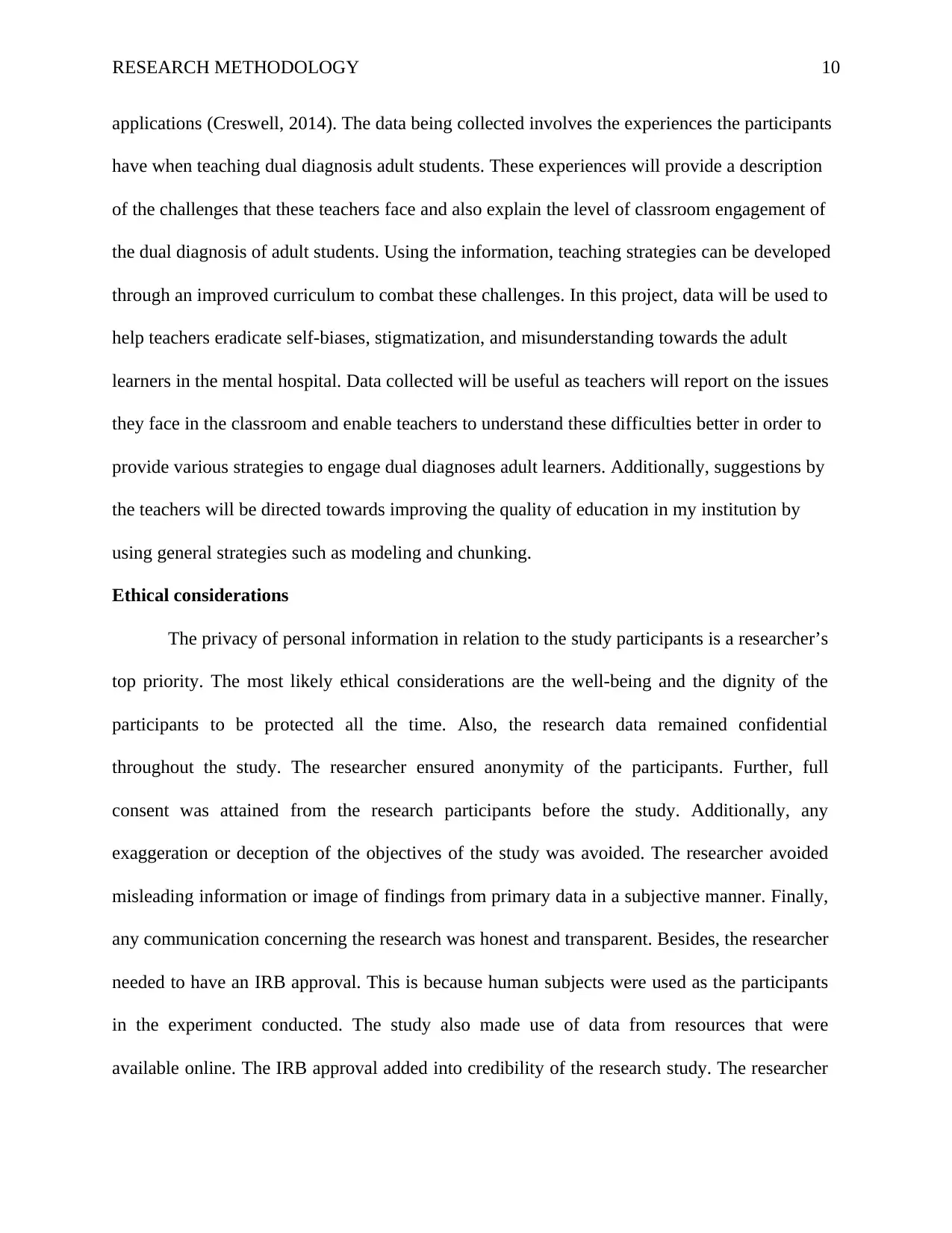
RESEARCH METHODOLOGY 10
applications (Creswell, 2014). The data being collected involves the experiences the participants
have when teaching dual diagnosis adult students. These experiences will provide a description
of the challenges that these teachers face and also explain the level of classroom engagement of
the dual diagnosis of adult students. Using the information, teaching strategies can be developed
through an improved curriculum to combat these challenges. In this project, data will be used to
help teachers eradicate self-biases, stigmatization, and misunderstanding towards the adult
learners in the mental hospital. Data collected will be useful as teachers will report on the issues
they face in the classroom and enable teachers to understand these difficulties better in order to
provide various strategies to engage dual diagnoses adult learners. Additionally, suggestions by
the teachers will be directed towards improving the quality of education in my institution by
using general strategies such as modeling and chunking.
Ethical considerations
The privacy of personal information in relation to the study participants is a researcher’s
top priority. The most likely ethical considerations are the well-being and the dignity of the
participants to be protected all the time. Also, the research data remained confidential
throughout the study. The researcher ensured anonymity of the participants. Further, full
consent was attained from the research participants before the study. Additionally, any
exaggeration or deception of the objectives of the study was avoided. The researcher avoided
misleading information or image of findings from primary data in a subjective manner. Finally,
any communication concerning the research was honest and transparent. Besides, the researcher
needed to have an IRB approval. This is because human subjects were used as the participants
in the experiment conducted. The study also made use of data from resources that were
available online. The IRB approval added into credibility of the research study. The researcher
applications (Creswell, 2014). The data being collected involves the experiences the participants
have when teaching dual diagnosis adult students. These experiences will provide a description
of the challenges that these teachers face and also explain the level of classroom engagement of
the dual diagnosis of adult students. Using the information, teaching strategies can be developed
through an improved curriculum to combat these challenges. In this project, data will be used to
help teachers eradicate self-biases, stigmatization, and misunderstanding towards the adult
learners in the mental hospital. Data collected will be useful as teachers will report on the issues
they face in the classroom and enable teachers to understand these difficulties better in order to
provide various strategies to engage dual diagnoses adult learners. Additionally, suggestions by
the teachers will be directed towards improving the quality of education in my institution by
using general strategies such as modeling and chunking.
Ethical considerations
The privacy of personal information in relation to the study participants is a researcher’s
top priority. The most likely ethical considerations are the well-being and the dignity of the
participants to be protected all the time. Also, the research data remained confidential
throughout the study. The researcher ensured anonymity of the participants. Further, full
consent was attained from the research participants before the study. Additionally, any
exaggeration or deception of the objectives of the study was avoided. The researcher avoided
misleading information or image of findings from primary data in a subjective manner. Finally,
any communication concerning the research was honest and transparent. Besides, the researcher
needed to have an IRB approval. This is because human subjects were used as the participants
in the experiment conducted. The study also made use of data from resources that were
available online. The IRB approval added into credibility of the research study. The researcher
Paraphrase This Document
Need a fresh take? Get an instant paraphrase of this document with our AI Paraphraser
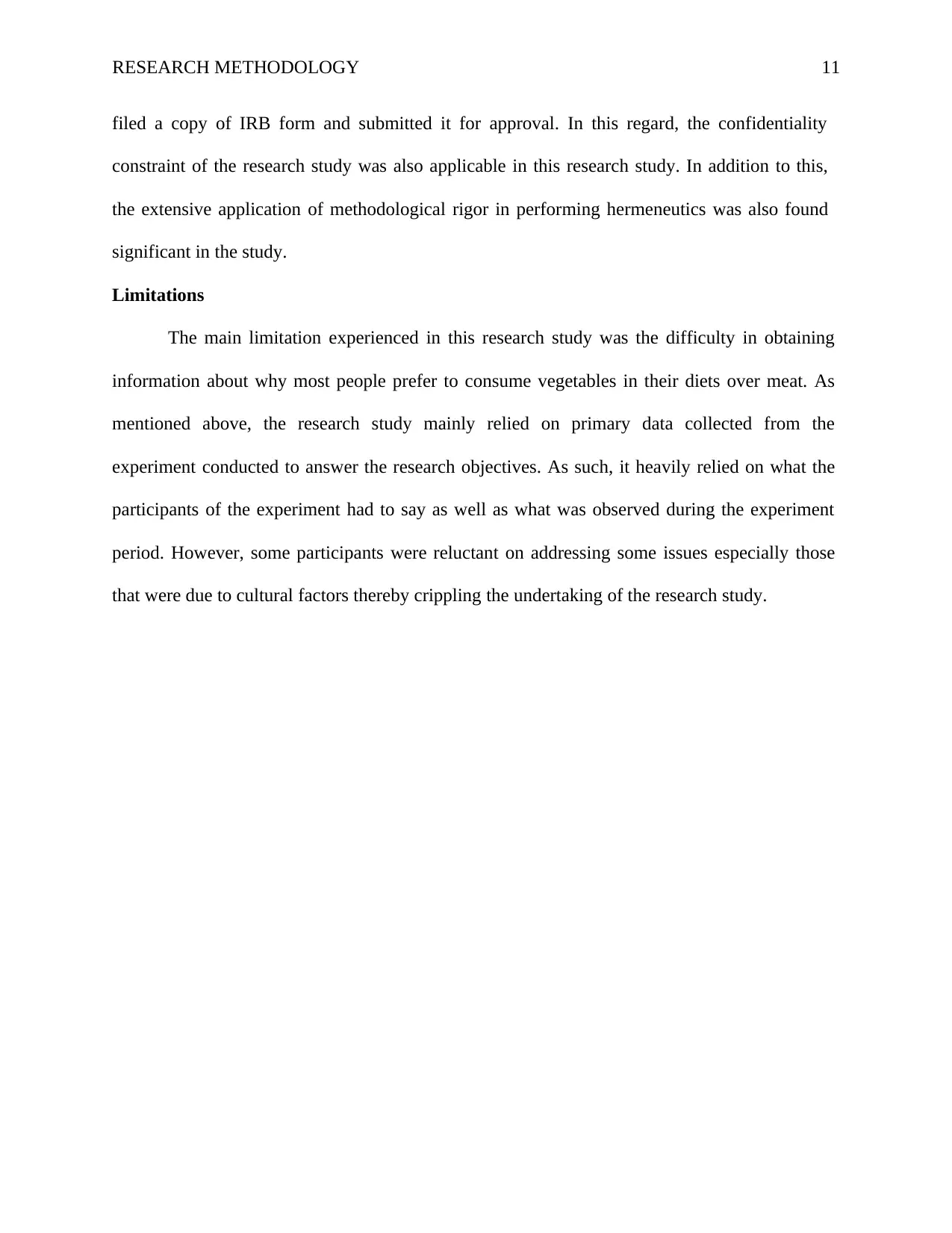
RESEARCH METHODOLOGY 11
filed a copy of IRB form and submitted it for approval. In this regard, the confidentiality
constraint of the research study was also applicable in this research study. In addition to this,
the extensive application of methodological rigor in performing hermeneutics was also found
significant in the study.
Limitations
The main limitation experienced in this research study was the difficulty in obtaining
information about why most people prefer to consume vegetables in their diets over meat. As
mentioned above, the research study mainly relied on primary data collected from the
experiment conducted to answer the research objectives. As such, it heavily relied on what the
participants of the experiment had to say as well as what was observed during the experiment
period. However, some participants were reluctant on addressing some issues especially those
that were due to cultural factors thereby crippling the undertaking of the research study.
filed a copy of IRB form and submitted it for approval. In this regard, the confidentiality
constraint of the research study was also applicable in this research study. In addition to this,
the extensive application of methodological rigor in performing hermeneutics was also found
significant in the study.
Limitations
The main limitation experienced in this research study was the difficulty in obtaining
information about why most people prefer to consume vegetables in their diets over meat. As
mentioned above, the research study mainly relied on primary data collected from the
experiment conducted to answer the research objectives. As such, it heavily relied on what the
participants of the experiment had to say as well as what was observed during the experiment
period. However, some participants were reluctant on addressing some issues especially those
that were due to cultural factors thereby crippling the undertaking of the research study.
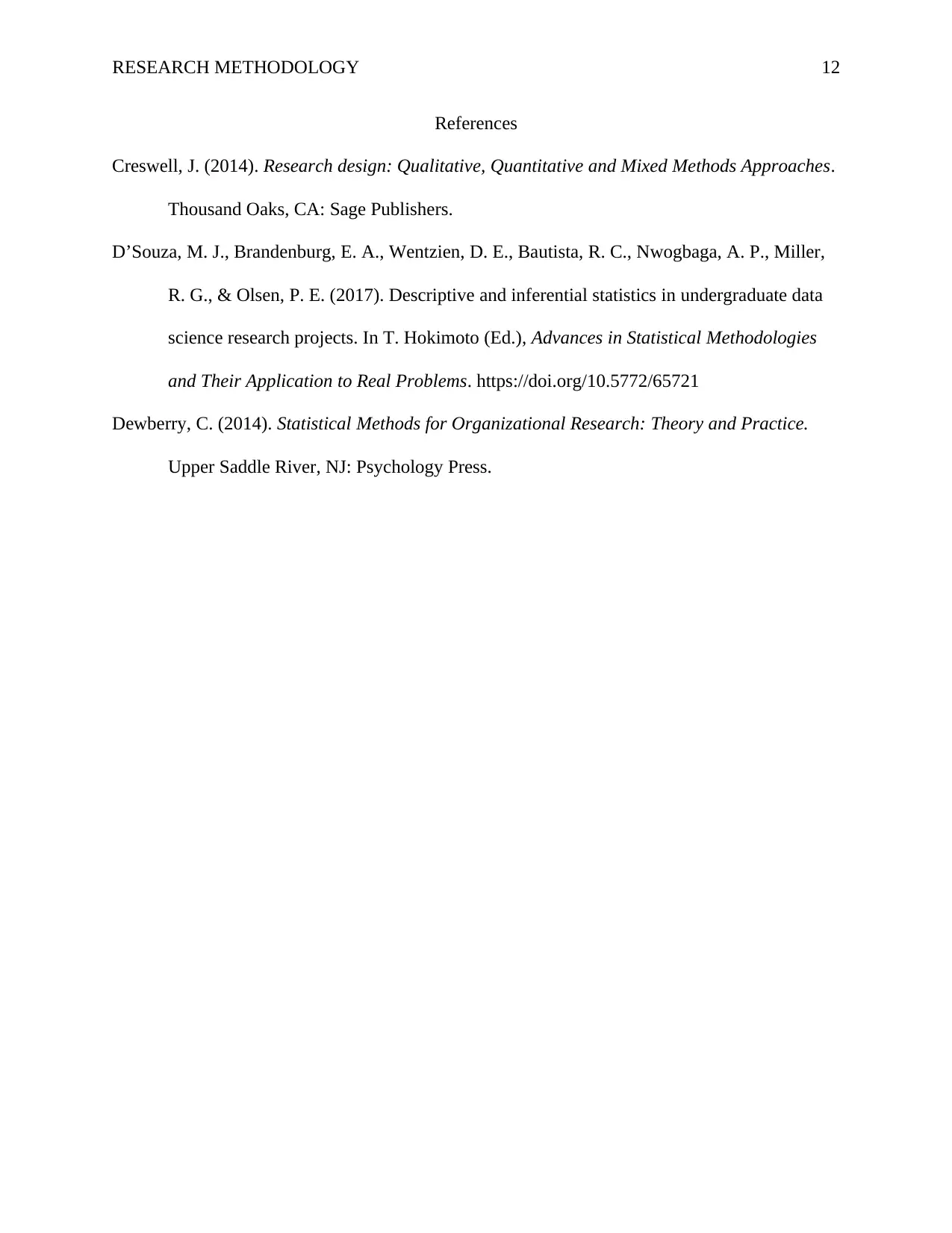
RESEARCH METHODOLOGY 12
References
Creswell, J. (2014). Research design: Qualitative, Quantitative and Mixed Methods Approaches.
Thousand Oaks, CA: Sage Publishers.
D’Souza, M. J., Brandenburg, E. A., Wentzien, D. E., Bautista, R. C., Nwogbaga, A. P., Miller,
R. G., & Olsen, P. E. (2017). Descriptive and inferential statistics in undergraduate data
science research projects. In T. Hokimoto (Ed.), Advances in Statistical Methodologies
and Their Application to Real Problems. https://doi.org/10.5772/65721
Dewberry, C. (2014). Statistical Methods for Organizational Research: Theory and Practice.
Upper Saddle River, NJ: Psychology Press.
References
Creswell, J. (2014). Research design: Qualitative, Quantitative and Mixed Methods Approaches.
Thousand Oaks, CA: Sage Publishers.
D’Souza, M. J., Brandenburg, E. A., Wentzien, D. E., Bautista, R. C., Nwogbaga, A. P., Miller,
R. G., & Olsen, P. E. (2017). Descriptive and inferential statistics in undergraduate data
science research projects. In T. Hokimoto (Ed.), Advances in Statistical Methodologies
and Their Application to Real Problems. https://doi.org/10.5772/65721
Dewberry, C. (2014). Statistical Methods for Organizational Research: Theory and Practice.
Upper Saddle River, NJ: Psychology Press.
⊘ This is a preview!⊘
Do you want full access?
Subscribe today to unlock all pages.

Trusted by 1+ million students worldwide
1 out of 12
Related Documents
Your All-in-One AI-Powered Toolkit for Academic Success.
+13062052269
info@desklib.com
Available 24*7 on WhatsApp / Email
![[object Object]](/_next/static/media/star-bottom.7253800d.svg)
Unlock your academic potential
Copyright © 2020–2026 A2Z Services. All Rights Reserved. Developed and managed by ZUCOL.





